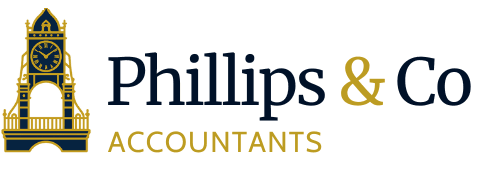Author: Phillips & Co Accountants, Chester
Date: 14 October, 2025
For thousands of sole traders and self-employed professionals, the home office has replaced the traditional workplace. While the commute might be shorter, the line between domestic and business costs can become blurred, especially when it comes to your tax return. One of the most common questions we receive is, “How do I claim for my home expenses without falling foul of HMRC?”
Getting this right is crucial. A well-calculated claim can significantly reduce your tax bill, but a mistake can lead to questions and penalties. As expert Accountants Chester, we’ve created this guide to demystify the process and help you claim with confidence.
The Two Methods for Claiming Home Expenses
When it comes to claiming for the costs of running your business from home, HMRC allows you to choose between two methods. The best one for you depends on your circumstances and how much time you want to spend on record-keeping.
Method 1: HMRC’s Simplified Expenses (The Flat Rate)
This is the most straightforward option. Instead of calculating the business proportion of your actual bills, you can claim a flat monthly amount. This rate is set by HMRC and depends on the number of hours you work from home each month.
25 to 50 hours a month: £10 per month
51 to 100 hours a month: £18 per month
101 hours or more a month: £26 per month
Who is this for? The simplified method is perfect for those who want to avoid complex calculations and minimise paperwork. It’s a quick and easy way to ensure you’re getting some tax relief. However, you cannot claim the flat rate and then also claim for a portion of your utility bills or internet—it’s one or the other.
Method 2: Calculating Actual Costs (The Detailed Method)
While it requires more effort, this method often results in a larger, more accurate claim. It involves calculating the exact business portion of your genuine household running costs.
What costs can you include?
You can claim a proportion of your variable household costs, such as:
Heating and electricity
Council Tax
Mortgage interest (not the capital repayment part) or rent
Home insurance
Broadband and phone line costs
How do you calculate the business proportion?
A common and fair method is to base the calculation on the number of rooms in your house.
Count the rooms: Count the total number of rooms in your home, excluding bathrooms and hallways.
Identify your workspace: Determine how many of those rooms you use for business (e.g., your one home office).
Calculate the time: Work out the percentage of time that the room is used for business purposes. If the room is a dedicated office used 100% for business, this is simple. If it’s a spare room used 50% of the time, you must reflect that.
Example:
Let’s say your home has 5 main rooms, and one is used exclusively as your office. Your total relevant bills (heating, electricity, council tax, etc.) are £3,000 for the year.
The business use is 1/5th (20%) of your home.
Your allowable expense claim would be 20% of £3,000, which is £600.
This method almost always allows for a higher claim than the flat rate, but robust record-keeping is essential.
Don’t Forget Other Key Allowable Expenses
While your home office costs are important, they are just one part of the picture. To ensure your tax return is as efficient as possible, remember to claim for all your business outgoings. Based on our work with countless local businesses, these are the main areas to focus on:
Office & Equipment: This includes essentials like stationery, printer ink, and postage, as well as larger purchases like computers, business phones, and specialist software subscriptions.
Travel Costs: You can claim for business-related travel using either a simple mileage allowance (45p per mile for the first 10,000 miles) or by calculating the actual running costs of a vehicle (fuel, insurance, repairs). Remember to include train fares, buses, and taxis for business trips.
Marketing & Subscriptions: All costs associated with promoting your business are claimable. This includes website hosting, online advertising, and print marketing. You can also claim for subscriptions to professional bodies and relevant trade publications.
Professional Fees: The fees you pay to your accountant, solicitor, or other professional advisors for their business services are allowable expenses. Yes, that means our fee for preparing your tax return is tax-deductible!
The Right Choice for Your Business
Choosing the right method for home expenses and ensuring you capture every allowable cost can feel overwhelming. The goal is to be tax-efficient without creating an administrative burden.
If you are unsure which path to take, or simply want the peace of mind that comes from a professionally prepared tax return, we are here to help. Contact Phillips & Co today, and let our team of expert Accountants Chester make your Self-Assessment simple, accurate, and as efficient as possible.
Call/WhatsApp today on: 01244 220 062
If you’d like expert guidance, contact Phillips & Co Accountants Chester today.
Keep More, Stress Less
Disclaimer
The information contained in this blog is for general guidance only. It does not constitute professional advice and should not be relied upon as such. Always seek tailored advice from a qualified accountant regarding your specific circumstances.
